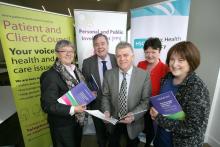
The PHA launched a major research report into Personal and Public Involvement (PPI) and its impact in Health and Social Care on 27 February.
The research, commissioned by the PHA and the Patient and Client Council (PCC), set out to:
- identify best practice in PPI,
- highlight barriers to involvement,
- suggest ways to overcome the barriers, and
- identify ways to measure the impact of PPI activity.
The research was undertaken by a research team from Queen's University and Ulster University, Health and Social Care (HSC) Trust staff and service users and carers. Central to this work was service user and carer involvement in the development of the research brief and the undertaking of the research. The research involved large-scale participation from staff across HSC and, critically, the widespread involvement of service users and carers.
At the launch of the research, PHA Chair, Andrew Dougal, welcomed the research findings and recommendations which will inform and support the PHA in its ongoing leadership role for PPI in the HSC.
Speaking at the launch, Andrew outlined that, “It is our fervent hope that all in leadership roles in health and social care continue to demonstrate their commitment to PPI and to ensure that it is an integral part of job descriptions, of all appraisals and all revalidations. It is critical that PPI plays a primary role in the design of new services and in the redesign of existing services.”
Mary Hinds, Director of Nursing and AHP’s, and Co-chair of the Regional HSC PPI Forum, stated that, “Across HSC we have achieved great progress for PPI. However, there is still much to be done to integrate PPI into our working practices. It is fantastic to hear about the numerous examples of good PPI practice and also acknowledgement that the PHA leadership has helped in our endeavours to embed PPI across the system.”
The research found that there has been a great deal of work undertaken and a marked improvement in PPI work since it was introduced into policy in 2007 but there are still challenges ahead. Ten recommendations have emerged from the research to help ensure that PPI becomes more of an integral part of the way that HSC works.
The recommendations include ongoing awareness raising for PPI, the investment of adequate and dedicated resources, the creation of a ‘PPI Champion’ staff role at HSC Trust level to provide practical support, and, building evaluation into PPI to measure its effectiveness.
Martin Quinn, Regional PPI Lead, stated that, “The PHA has embraced the recommendations and they form the backbone of the PPI Action Plan 2016–19, which will help us to continue work to integrate PPI into our working practices.”
Check out the recommendations and access the research reports here
The research was funded by HSC Research and Development Division, PHA.

